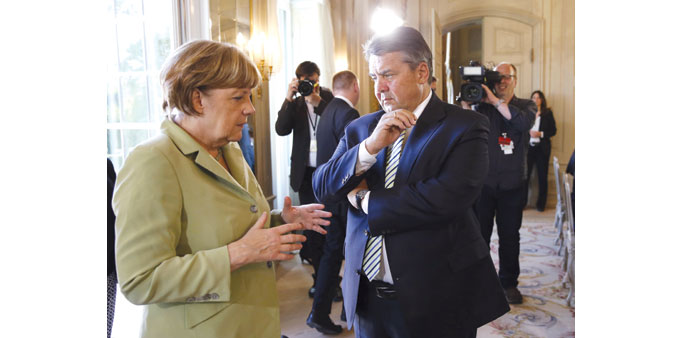This picture taken on June 4 shows Merkel with Gabriel prior to the start of a meeting with members of her government and representatives of industry and labour union organisations at the German government guesthouse Meseberg Palace in Meseberg. Germany’s Social Democrats (SPD) are openly doubting whether Gabriel can beat conservative rival Merkel in the next election due in 2017.
Reuters
Berlin
Germany Chancellor Angela Merkel’s leadership during the Greece crisis has given her conservatives a chance of winning an absolute majority if an election were held next week, an opinion poll showed yesterday.
The results of the poll came a day after Der Spiegel news magazine said in an unsourced report that Merkel, who turned 61 on July 17, had decided to run for a fourth term and had started planning her 2017 re-election campaign.
Merkel’s chief-of-staff Peter Altmaier dismissed that idea in an advanced release of a story to run in mass-selling daily Bild today.
“It is and remains speculation,” Altmaier told Bild when asked if and when Merkel would announce she was running for another term as chancellor, adding that she would decide when she believed the time was right.
The chancellor has ruled Germany since 2005 and now governs in coalition with the Social Democrats (SPD).
Not since Konrad Adenauer’s third term as chancellor ended in 1961 has the CDU/CSU ruled with an absolute majority.
The Emnid poll for weekly newspaper Bild am Sonntag put support for Merkel’s Christian Democrats (CDU) and their sister party, the Bavarian Christian Social Union (CSU), at 43%.
The survey of 1,860 people showed that for the first time since June 2005 support for the CDU/CSU was equal to that of all other parties that would surpass the 5% hurdle required to win seats in the Bundestag lower house of parliament.
Such a result would give Merkel’s conservatives a chance of winning an absolute majority if an election were held next week.
The change came as support for the far-left Left party fell by one percentage point.
An absolute majority would give Merkel’s conservatives the chance to govern without compromising on issues such as pension reform and the minimum wage, as they have done with the SPD.
Merkel’s handling of the Greece crisis, in which she worked tirelessly to negotiate the blueprint of a deal with Athens, secured her support.
“During the Greece crisis, Merkel showed herself to the German people as a politician who can be relied on in difficult situations,” Torsten Schneider-Haas of Emnid told Bild am Sonntag.
Merkel has not made any public comments about whether she would run for a fourth term, although she did hint in a speech in Cologne last year she would stand again.
She is on holiday hiking in the Alps.
Merkel also shared power with the SPD in her first term as chancellor.
In her second term, she shared power with the pro-business Free Democrats (FDP).
In a country that cherishes stability, Merkel is only the eighth post-war chancellor. She has no obvious rivals in the CDU.
The SPD is openly doubting whether their leader, Sigmar Gabriel, can beat Merkel in the next election due in 2017.
There are no term limits in Germany and the last CDU chancellor, Helmut Kohl, served for 16 years before losing his bid for a fifth term in 1998 to Gerhard Schroeder of the SPD.
Neither was as popular among voters as Merkel.

